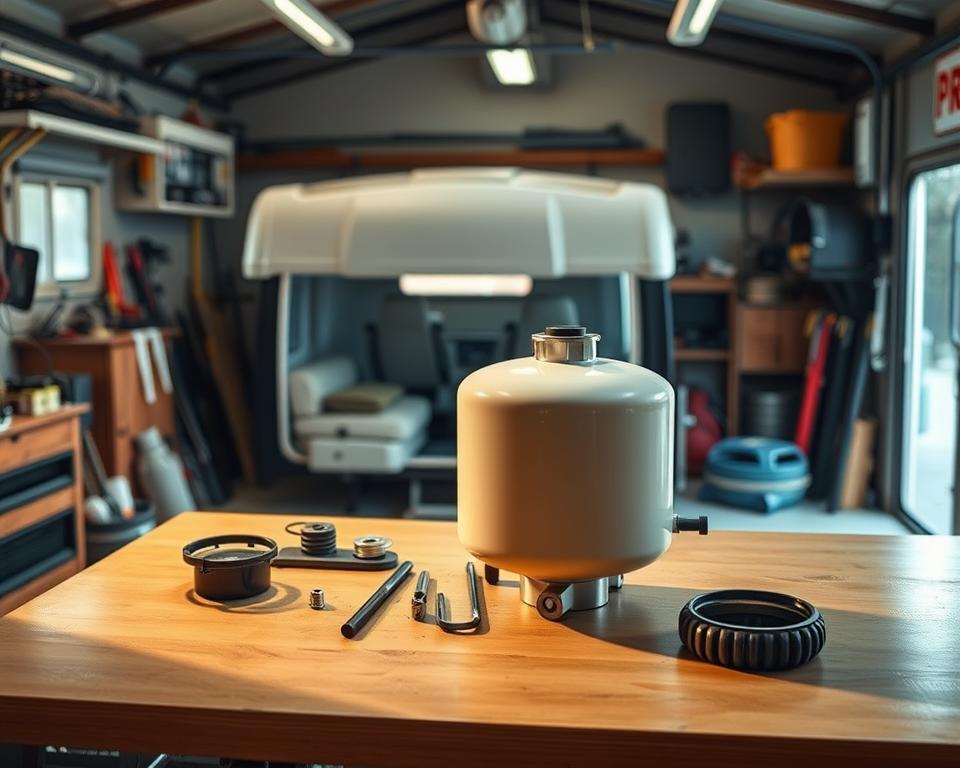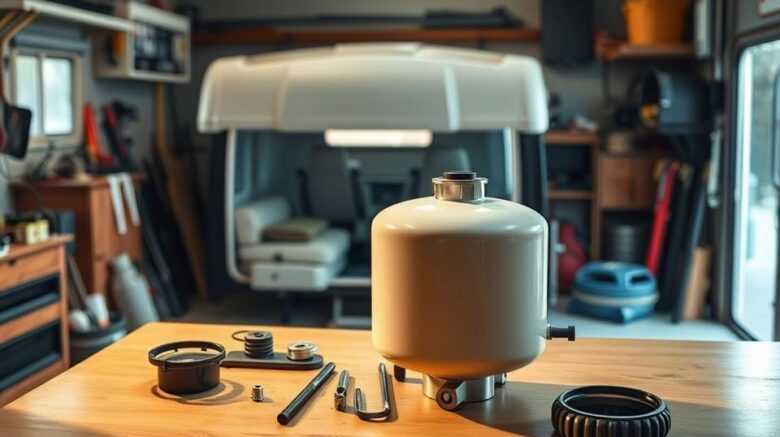RV Wastewater Pump Guide: Essential Tips for Maintenance
Have you ever thought about the mechanics of your camper’s waste disposal system? Knowing the ins and outs of your camper sewer pump can prevent mishaps, enhancing your road trips. It’s about controlling waste effectively and avoiding bad odors. With this manual, you’ll discover vital maintenance tips for RV waste pump. Every tip is created to maintain your sewer network’s best operation.
Learning About Your Camper Waste Pump Configuration
The RV sewer pump system is essential for waste management, making RV outings more comfortable. It features two principal tanks: the black water tank for solid waste and the grey-water reservoir for water from wash basins and shower stalls. Differentiating these tanks is important to avoid clogs and keep your RV functioning efficiently.
An RV macerator pump is a popular choice for waste management. It pulverizes solid waste into minute particles, easing disposal. Alternatively, a classic RV pump is available. It effectively moves waste without pulverizing, for those seeking a simpler option.
Knowing your RV’s sewage pumping system is essential to avoiding problems and ensuring smooth examinations. Operating the system efficiently can prevent messes, boosting your outdoor adventures.
Importance of Regular Maintenance
Maintaining your RV sewage disposal pump is imperative for a seamless trip. Without proper upkeep, you may face odors, clogs, or backups. These glitches can spoil your road trips.
Consistent servicing avoid such snags and lengthen your system’s life. By reviewing hoses and seals, you improve efficiency. A regularly checked RV sewage pump ensures effective refuse removal, letting you enjoy continuous journeys.
Regular servicing also results in financial savings over time. Oversight can cause significant problems, requiring pricey repairs. Committing to regular maintenance keeps your motorhome in peak form, conserving money long term.
When to Empty Your RV Septic Tank?
Knowing the right time to pump your RV Septic Tank is crucial for its upkeep. It’s suggested to pump every three to five days during use. For brief excursions, pumping on return may work fine.
Interval depends on different variables. Tank capacity and usage level are critical. Ideally pump when it reaches two-thirds full. This helps support smooth flow and prevent obstructions.
Tracking your RV Septic tank capacity is crucial for a hassle-free trip. Handle your camper’s effluent to prevent issues while traveling.

Optimal Methods for Tank Disposal
Properly emptying RV tanks is vital for your motorhome’s cleanliness and performance. Start with the black tank to let the grey tank liquid rinse leftover solids. This strategy avoids clogs and ensures uninterrupted discharge.
Choose a premium waste hose for disposal. A reliable hose prevents leaks and secures connections. Use a tank rinser for a complete flush, using water pressure to remove residual sludge, improving cleanliness.
Comprehensive emptying prevents residue buildup, warding off foul odors and potential issues. To maintain an optimal sewage system in your motorhome, observe these guidelines:
- Regularly use a tank treatment to manage smells and decompose waste.
- Watch capacity to avoid overflows.
- Inspect your RV waste pump regularly for clogs and wear.
- Perform a deep tank flush every 4–8 weeks, even during occasional use.
Implementing these practices enhances your sewage system’s longevity and efficiency, ensuring smooth journeys.
Preventing Odors and Clogs
For a memorable adventure, keeping odors at bay is essential. Maintain adequate water level to aid in breaking down waste, warding off unpleasant odors. Also, choosing camper-safe TP helps prevent clogs, avoiding backups.
For better sewage management in campers, try bio-agent additives. These effectively break down waste, easing upkeep. Ensure vent pipe clearance to keep air moving freely in the plumbing system.
Careful waste habits is vital to avoiding tank issues. Avoid flushing wipes, feminine products, and paper towels. These non-degradable objects can cause major clogs. Following these tips helps maintain a cleaner camping environment.
Maintenance Advice for RV Sewage Pumps
Servicing your RV waste pump network is vital for seamless adventures. Verify seal condition frequently to avoid drips. Worn seals can cause unexpected spills, harming your RV.
To banish smells and maintain cleanliness, sanitizing is crucial. Carry out intensive cleans quarterly to avoid deposits, ensuring the system works efficiently. These steps are essential for maintaining a on-board grinder, promoting long life and efficient operation.
Oiling valve mechanisms is another important task. It helps ward off seepage and maximize functionality. Checking sensor accuracy is essential for correct levels, preventing run-ons and unexpected pump issues. Maintaining vigilance makes your RV adventures cleaner and more enjoyable.
When to Call in a Pro for Pump-Out
Identifying septic problems ahead can protect you from costly repairs. A tell-tale indicator you need a professional pump-out is slow draining. When sinks and toilets take longer to clear, it often points to backups. It suggests your system may be full.
Lingering smells are another clear sign of sewage troubles. Stench that won’t go away despite cleaning suggest trapped waste. It’s crucial to inspect the clear elbow attachment when dumping waste. Visible residue signals it’s time for professional pump service.
Technicians employ water-jet systems to dismantle stubborn blockages efficiently. Neglecting these signs can escalate into major problems. Therefore, it’s vital to seek help immediately when issues arise.
| Indicators of Sewer Trouble | Suggested Steps |
|---|---|
| Delayed Drainage | Look for blockages; schedule pro maintenance |
| Persistent Odors | Inspect fittings; schedule pump-out |
| Obvious Debris | Contact pump service for thorough cleaning |
How to Pick Your Camper Macerator
When selecting an RV macerator pump, weigh its volume handling, build quality, and compatibility with your RV’s size. A premium macerator is key for efficiently breaking down waste. This is especially vital for RVs requiring constant pumping. High-end pumps boost sewage handling, ensuring a better travel experience.
A range of options cater to diverse needs. For an well-founded selection, focus on these key factors:
- Capacity: Check output volume compatibility.
- Durability: Choose pumps with robust construction.
- Ease of Use: Select pumps with intuitive controls.
- Compatibility: Verify the pump fits your RV plumbing.
Taking time to compare when choosing an RV macerator pump improves travel enjoyment and ensures proper sewage disposal.
RV Sewer Pump Problem-Solving
Effective problem-solving for your RV sewer pump is crucial in resolving common sewage issues before they worsen. If you notice lethargic outflow, surprise blockages, or persistent odors, take immediate action. These are definite clues of malfunction requiring attention.
Start with checking the pump, its connections, and hoses. Check for any clogs that could slow flow. Ensure inlet and outlet fittings are leak-free. Also, verify the pump’s power supply for reliable current.
If basic checks don’t detect the issue, listen to the pump’s sound. A unit that’s abnormally loud or too quiet may have internal damage. Also, check for leaks, as these can magnify sewage problems. With these troubleshooting steps, many RV owners can find and fix issues early, avoiding costly repairs.
Extended RV Pump Upkeep
For lasting performance, dedicate yourself to regular sewer pump upkeep. Flush the system consistently to prevent clogs. Set up and adhere to a maintenance routine, keeping everyone informed of their roles. This considerably increases your waste system’s lifespan.
Informing yourself and others on proper waste disposal is vital. This preventss issues and fosters shared responsibility. The result benefits both users and the sewer system.
- Inspect plumbing and hoses periodically
- Maintain clear filter screens
- Scheduling professional servicing annually
- Select suitable additives
Following these guidelines prolongs your camper’s sewage system’s durability and keeps it functional, making travels more delightful.
Final Thoughts
Caring for your RV sewer system diligently is crucial for hassle-free camping adventures. Regular attention to RV sewer system maintenance drastically lowers problem risks, letting you focus in the journey. By understanding your system and using reliable sewage methods, your trips will be free of waste management woes.
Applying the critical tips from this guide promotes RV waste management and enhances your travel comfort and safety. Ensure pump reliability by following best upkeep practices and tackling potential issues promptly.
Keeping informed about your RV sewer system yields benefits. It guarantees homely comforts while exploring. Cheers to joyous and untroubled journeys!
Common Queries
How can I tell it’s time to empty my RV Septic tank?
Pump the RV Septic tank when it hits 66% capacity.
How do black and grey tanks differ?
Black tank is for sewage waste. Whereas, the grey tank collects water from sinks and showers.
When to service my RV sewer pump?
Check seals, sanitize, and clean quarterly.
Recommended products for RV sewer pump maintenance?
Opt for biological tank additives.
How to keep my camper’s sewer lines clog-free?
Maintain sufficient water level and avoid wipes and paper towels.
How to know if I need expert pump-out?
Persistent smells or gurgling indicate pro help.
Tips to optimize camper macerator performance?
Ensure capacity and compatibility.
Key inspection points for a thorough RV sewer cleanse?
Flush lines, replace seals, and sanitize components.
Guidelines for extended RV pump care?
Inspect hoses, treat tanks, and schedule annual pro servicing.
What’s the pumping interval for frequent RV use?
Schedule pump-outs every 3–5 days.
